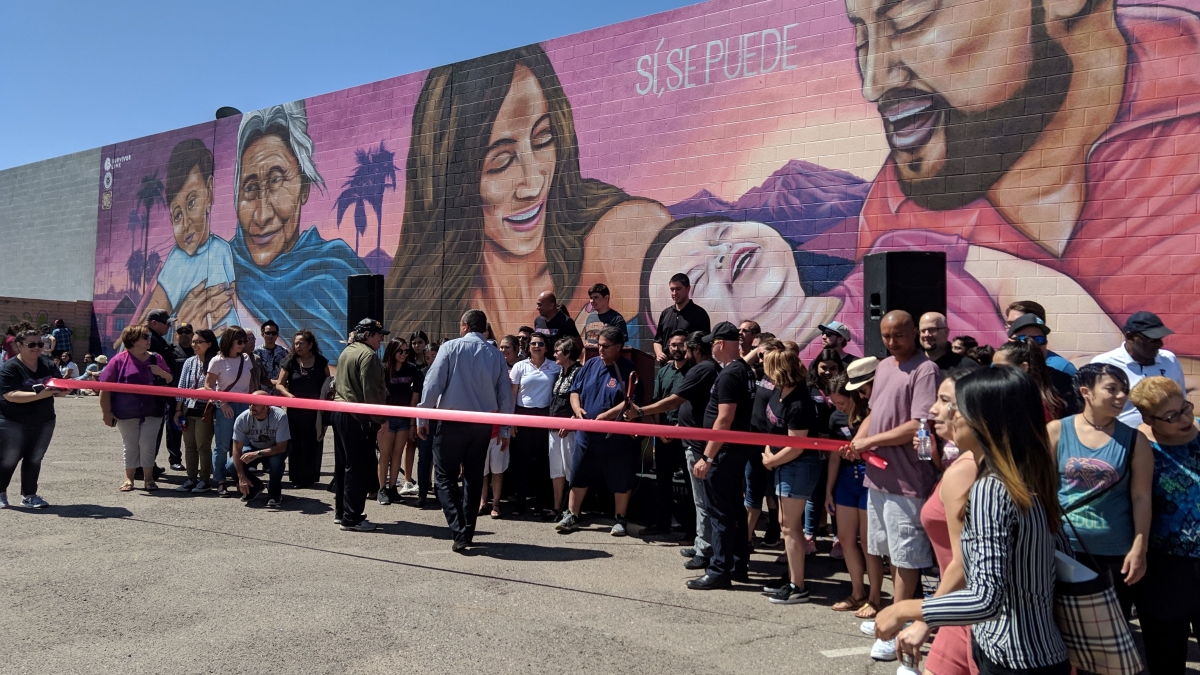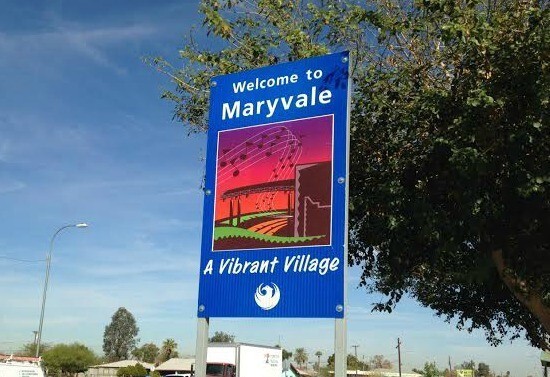Success redefining ASU-community partnerships in Maryvale earns President’s Medal for Social Embeddedness

Maryvale residents dedicated a "Si Se Puede" ("Yes You Can") mural in 2019. ASU President Michael Crow will honor the Maryvale One Square Mile Initiative Dec. 7 with the President's Medal for Social Embeddedness. ASU photo
For five years, Arizona State University faculty and students have collaborated with residents of the west Phoenix community of Maryvale to foster wide-ranging changes on a variety of community concerns — from financial literacy to public safety to education. The ASU initiative that started that effort will be honored Dec. 7 by ASU President Michael Crow with the President’s Medal for Social Embeddedness.
The Maryvale One Square Mile Initiative is the seventh Watts College of Public Service and Community Solutions-based recipient of the medal since it was first awarded in 2020.
The One Square Mile Initiative, created through the generous 2018 gift of Mike and Cindy Watts, who grew up in Maryvale, is administered by the college-based Design Studio for Community Solutions (DSCS). First named for an area of Maryvale of about that size, efforts have grown to include more of the community.
Watts College Dean Cynthia Lietz said she deeply appreciates the Watts family’s generous investment, which led to the creation of the design studio.
“This program illustrates the ASU Charter, and being recognized with the president’s medal highlights its social embeddedness and impact,” Lietz said. “Congratulations to our wonderful team and thank you to the community partners who have been an integral part of this work.”
Encompassing more than 35 square miles from Grand Avenue to 99th Avenue between Camelback and McDowell roads, Maryvale is the most populous of the 13 “villages” comprising Phoenix and has the highest population with about 230,000 residents, which makes Maryvale home to approximately 5% of Arizona’s population. If Maryvale were its own city, it would be the state’s eighth largest municipality.
Economically and culturally diverse, Maryvale is widely recognized as Arizona’s first planned residential community. When developer John F. Long built it in 1955, Maryvale featured 25,000 affordable family homes with spaces for parks, schools and community services.
Studio’s first major project
The One Square Mile initiative was the DSCS’ first major project, which, according to its description on the Watts College website, was designed to ask and answer the questions: “What if social services, community development and leadership strategies were working off the same game plan?" and "What might a comprehensive community change initiative in Maryvale look like?”
The initiative’s first year was dedicated to interviewing more than 60 community stakeholders toward assembling data to co-create a list of community goals with its residents and leaders.
Throughout the five years, DSCS’ One Square Mile initiative team has worked to effect change by moving at “the speed of trust,” said DSCS Director Allison Mullady.
Mullady said the COVID-19 pandemic slowed progress on some efforts, but this year she and her staff decided that it was time to showcase their work.
“We want to showcase not only the relationship-building we’ve done in Maryvale, but projects we’ve developed with community members and agencies. We wanted to focus on areas funded from the Watts gift, and what the Watts family wanted to see in Maryvale, but also on challenges for the communities,” Mullady said.
According to the initiative’s submission to be considered for the president’s medal, “the Maryvale community confronts a multitude of social, economic and human consequences that pose significant obstacles to its inhabitants. One of the primary issues is poverty, which restricts access to essential services like health care, education and job opportunities.”
Maryvale residents also face other community issues, such as a high crime rate, low educational attainment and housing insecurity, all of which “impact the health, well-being and quality of life for Maryvale residents, highlighting the critical need for sustainable, long-term solutions to address these issues,” the application stated.
Authentic community engagement, practical results
DSCS laid groundwork for success with authentic community engagement, and gained practical results, Mullady said. In addition, the studio staff involved many ASU faculty from many disciplines, who learned more about how to foster authentic relationships and created meaningful courses that reflected that development.
Mullady said the ASU faculty, staff and students took the time to learn about the Maryvale community, which paid dividends later when solutions were planned and implemented. Strong relationships built with the devotion of a talented ASU team have helped the initiative’s work flourish in the past couple years, she said.
A sign welcomes visitors to Maryvale, the largest of Phoenix's villages and the state's first planned residential community. ASU photo
“We have a lot of great projects that are well received and have great impact with good prospects for the next several years,” Mullady said.
The initiative’s future involves continued focus on working with youth and building programs that help residents learn financial literacy. The team partnered with local financial institutions to facilitate a bilingual financial literacy program last spring. This semester, it will continue at one of the initiative's key partners, St. Vincent de Paul Catholic School. In addition, the team is starting a youth sports development program at Desert West Community Center, which will focus on supporting young women’s leadership skills through a volleyball and youth development program. All of these projects can be replicated and used elsewhere in Maryvale or in other communities, Mullady said.
The studio will continue to be a resource for others at ASU who want to learn from the work the studio has been doing, encouraging others to co-create solutions with the community to meet its needs, she said.
“None of this would have happened without the Watts family,” Mullady said of the initiative’s accomplishments with residents. “(Mike and Cindy Watts) have been extremely supportive of our work. They’ve been very excited and they’ve met our students. It’s really great. Their financial support is helping the community reach its goals.”
7 Watts College-based recipients
Seven Watts College-based programs and people were honored with the President’s Medal for Social Embeddedness in 2020, 2021 and 2022.
In 2022, Bridging Success and the Inside-Out Prison Exchange Program, both based at the Watts College, each received a President’s Medal for Social Embeddedness. Bridging Success helps alumni of the foster care system overcome obstacles to succeed in higher education. Inside-Out, based at the School of Criminology and Criminal Justice’s Center for Correctional Solutions and offered with the Arizona Department of Corrections, Rehabilitation and Reentry, is a class combining 10 “outside” undergraduate students learning together with 10 incarcerated “inside” undergrads in a prison setting.
In 2021, the medal was given to two Watts College-based programs, School Participatory Budgeting and Thrive in the 05. Also that year, Stephanie Zamora, a Watts College graduate student, was part of the Guadalupe COVID-19 community response team, which received the medal. In 2020, Crow presented the medal to the School of Social Work-based Survivor Link program, administered by the Office of Gender-Based Violence.


